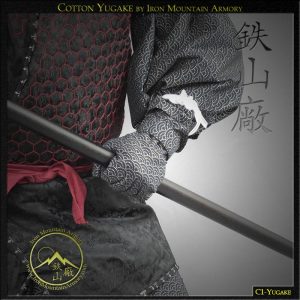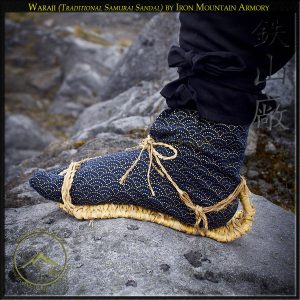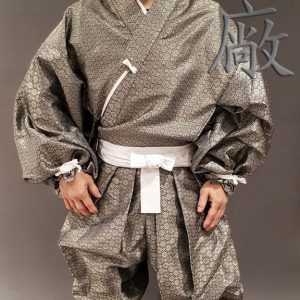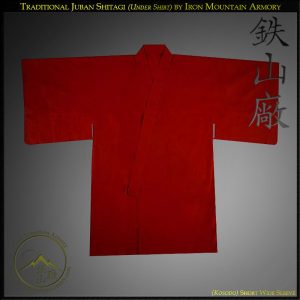- Traditionally Handcrafted
- Customizable
- Shipped Direct From The Armory
- Best Price Guarantee
- World wide delivery
Katsumoto Daimyo Jinboari is designed in honor of the Last Samurai, fictional character Moritsugu Katsumoto. In the movie Katsumoto is believed to have portrayed real life Saigo Takamori who was the most influential samurai and politician in the crossover of Edo to Maiji eras. Saigo Takamori was hailed as one of the “Three Great Nobles” who led the “Meiji Restoration“. Although he originally supported the Meiji Restoration, which disbanded the Tokugawa shogunate (striping them of their power and lands), his support shifted when seeing the systematic persecution of the samurai by the new Japanese Government. It was Saigo Takamori who led the Satsuma Rebellion, which united the last of the samurai in their last war in Japanese history. Because of this, Takamori is considered to be “The Last True Samurai” (not Tom Cruise).
The jinbaori were first worn by Daimyo and higher ranking samurai and then later by samurai of all ranks. The vest of course looked great when worn with or without the samurai armor, it also kept the samurai both dry and warm, while marching, at cerimonie and on the battle field. A Jinbaori (陣羽織 surcoat or samurai vest) is a type of haori (kimono style jacket) with the purpose to be worn over armor, protecting the samurai and his armor from the elements and became common around 1550. Over the course of the Sengoku period, it evolved and became more elaborate and decorative with various motifs as an expression of the Samurai’s wealth, power and aesthetic taste. Although typically worn by higher ranking samurai, the jinbaori could be worn without restriction, for any samurai class on and off the battlefield. The jinbaori were often waist length, without sleeves, featured a high open collar going down the front and usually with support material on the shoulders to help keep them laying straight. Traditionally the jinbaori can be made from any material. Most common materials were wool, brocade, cotton and later silk.
We offer highly customizable Jinbaori Surcoats / Samurai sleeveless jacket, which you can design to match many of our suits of armor. We also offer the option of adding kikko (armored plating) to the top shoulder section. Our samurai clothing and accessories are featured in the docudrama “Age of Samurai: Battle for Japan” by Netflix & the Smithsonian Channel.
Features: Kumi-Gashira Jinbaori
Custom measurements you provide are for reference only. Alterations may be made for a proper traditional fit as deemed necessary by our seamstress
[table id=236 /]
Before Ordering Please Note: Measure your chest with the clothing you will be wearing under it. If you plan to wear with a Traditional Hitatare add 5 cm to your actual chest size. If you plan to wear your Jinbaori with a yoroi, please add 10 cm to your actual chest size. For lengths, we recommend measuring from your shoulder to mid-thigh. If you have a larger than average chest, add a few extra cm to the front length. Your sizes are for reference only, as each person has their own personal preference on how they like their jinbaori to fit, we can not guarantee a perfect fit. Also if you request a mon to be added, please know we use heat transfer vinyl decals, we do not embroider. Standard size fits a person of 5′ 8″ (176 cm) tall and 106 cm chest. Jinbaori are usually worn loose fitting.
[table id=PF /]
References: “Armor Surcoat,” British Museum Gallery Labels. – “Samurai Class Men’s Winter Formal Surcoat,” LACMA, January 2015.



